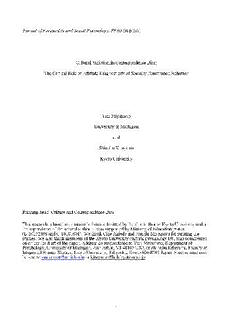
Cultural Variations in Correspondence Bias: The Critical Role of Attitude Diagnosticity of Socially Constrained Behavior PDF
33 Pages·0.237 MB·English
Most books are stored in the elastic cloud where traffic is expensive. For this reason, we have a limit on daily download.
Preview Cultural Variations in Correspondence Bias: The Critical Role of Attitude Diagnosticity of Socially Constrained Behavior
Description:
Upon observing another’s socially constrained behavior, people often ascribe to the person an attitude that corresponds to the behavior. This effect (called the correspondence bias, or CB) can result either because the socially constrained behavior is still diagnostic of an underlying attitude of the actor or because the perceiver has a psychological bias that favors dispositional attributions. As predicted, when a socially constrained behavior was diagnostic of the actor’s attitude, both Americans and Japanese showed an equally strong CB. In contrast, when the behavior was made minimally diagnostic, Americans continued to show a strong CB, but Japanese ceased to show any CB (Study 1). Furthermore, a mediational analysis revealed that the cross-cultural difference is due in part to the nature of explicit inferences generated on line during attitudinal judgment (Study 2). Implications for the cultural grounding of social perception are discussed.2
See more
The list of books you might like
Most books are stored in the elastic cloud where traffic is expensive. For this reason, we have a limit on daily download.
